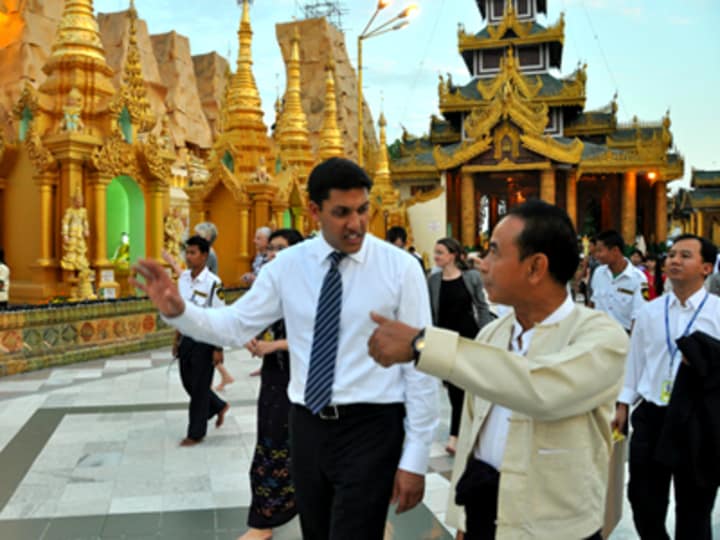
Could foreign aid help Myanmar leapfrog and become a regional leader in green development? The answer, according to a growing number of advocates and politicians, appears to be yes — and the country’s chairmanship next year of a regional forum could be a bellwether moment in that transformation.
Earlier this week, a congressional hearing in Washington, D.C. served as a forum for these advocates to push the United States — and donors elsewhere — to seize the moment and help the fledgling Southeast Asian country establish a smart water strategy, conserve its biodiversity and lead on other environmental issues.
Devex spoke with a top government official about U.S. plans for a country that, after years of isolation, is emerging as a new aid darling as donors and their implementing partners rush to establish operations there.
Myanmar started emerging in 2011 from decades of military rule, and still faces significant human rights challenges. But several U.S. lawmakers and environmental leaders shared their thoughts on why now is the time for the country to overcome those obstacles, step up to the plate and become a regional leader on environmental issues and so-called “green” development.
The opportunity will come in 2014, when Myanmar assumes for the chairmanship of the Association of Southeast Asian Nations for the first time since it joined the regional bloc in 1997, an unthinkable milestone just a few years ago when soldiers were arresting Buddhist monks demonstrating peacefully against the junta on the streets of Yangon.
USAID wants to be involved
Southeast Asia faces enormous challenges to its rich biodiversity, vital water resources, and valuable forests, all of which struggle to survive the pressure of rapid development and resource extraction — especially related to the production of global commodities like palm oil and paper.
Myanmar in particular suffers severe environmental degradation, and this is where the U.S. Agency for International Development also sees a chance for the agency to carry out in the country its “model mission” built to emphasize USAID’s reform agenda, which focuses on partnerships and private sector engagement, deputy assistant administrator for Asia Greg Beck told Devex.
USAID reopened its Yangon mission in Sept. 2012 after 24 years of silence following the military regime’s brutal crackdown on peaceful protestors demanding political reforms in 1988.
So how can the agency be successful in Myanmar?
“This is an incredibly dynamic, fluid, fast-changing environment, which requires a new way of doing business if we’re to continue to have deep impact and, frankly, to remain relevant,” said Beck, who also spoke at the Senate foreign affairs hearing.
Myanmar as part of the US Asian ‘pivot’
Myanmar’s emergence from international isolation two years ago coincides with a U.S. foreign policy shift, the so-called “Asia Rebalance,” which has intensified U.S. foreign aid programming and diplomatic efforts in the Asia-Pacific region.
Beck traveled with Secretary of State John Kerry this month to Brunei to meet with representatives from the ten ASEAN member countries and highlight recent USAID programs in the region.
The rebalance or “pivot” is seen as a way for the United States to regain part of its past influence over the development paths, norms, and rules that guide the continent in the future, as China flexes more and more regional power and military muscle.
In the case of Myanmar, rapid growth overall and the country’s opening-up have drawn attention from U.S. businesses hoping to compete in a market dominated by investors from powerful Asian neighbors. USAID hopes it can spur that investment through partnerships with businesses that also prioritize environmental preservation.
The agency can add the most value, Beck explained, by building a platform to work with the government, civil society, businesses and other donors to identify the “nexus between private sector interests and development priorities.” Food security, Beck hinted, is another sector where such a platform could address a critical challenge for Myanmar with opportunities for environmental add-on benefits.
USAID has had recent success elsewhere in the region. The Tropical Forest Alliance 2020 held its first workshop last month in Indonesia, bringing together private sector and civil society groups, as well as Unilever and Staples in a consumer goods forum that led to private sector and governmental commitments to combat deforestation and protect indigenous groups that rely on forest resources.
Not there yet
Allegations of widespread human rights abuses by the military against the Rohingya, a stateless Muslim minority ethnic group, pose distinct challenges for efforts to promote indigenous rights and protection, and also call into question whether Myanmar is ready to lead the region to equitable resource governance policies.
Some feel environmental issues have been conspicuously and dangerously absent from the U.S. policy approach to Myanmar since the junta began relinquishing control in 2011. But most NGOs are thrilled for the environment to finally be part of the general discussion on how the country can develop.
World Wildlife Fund President and CEO Carter Roberts hopes Myanmar’s status will give U.S. environmental NGOs, lawmakers, diplomats and aid workers an opportunity to work with the country to put forward a set of agenda items for ASEAN that build up green economy principles for all Southeast Asia.
“I never thought I’d be talking about Myanmar’s influence in Southeast Asia,” Roberts said during the Senate hearing on Wednesday. “Sometimes there are moments when countries change governments and things happen, then shame on us if we don’t provide the right technical assistance at the right time.”
As chair of ASEAN, Myanmar will have a distinct opportunity to highlight environmental concerns and to forward regional initiatives to address them. But before that happens, the government — with U.S. assistance — will need to develop the internal capacity required simply to convene and manage the hundreds of meetings it is expected to host for the regional bloc.
Read more on U.S. aid reform online, and subscribe to The Development Newswire to receive top international development headlines from the world’s leading donors, news sources and opinion leaders — emailed to you FREE every business day.
